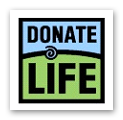Over 112,000 people are currently on the national transplant waiting list. About 59% of the waiting list consists of ethnic minorities. National Minority Donor Awareness Week raises awareness for the need of more organ, eye, and tissue donors, especially among communities of color. While organs aren’t matched according to race or ethnicity, blood and tissue types are more likely to be compatible among members of the same race or ethnicity. Therefore, it is critical that minority donors are found.
Organ and tissue donation can be an uncomfortable subject filled with a lot of fear and apprehension. As such, there are some myths or incorrect information surrounding the subject. Let’s set the record straight. We want you to have all the facts when making a decision as important as choosing (or not choosing) to become a donor.
Choosing to be a donor doesn’t affect your own health and well-being.
In other words, being an organ or tissue donor will not affect the medical care you receive in an emergency. Doctors and medical staff will do everything they can to save your life if you are hurt or injured and, oftentimes, they’re not even aware of whether you’re a donor or not while they’re caring for you. Only after your death has been legally declared will the organ procurement organization (OPO) check the registry to see if you’re a donor. Hospitals do not have access to this registry.
Choosing to be a donor doesn’t cost you anything.
Your family will never be charged for any expenses related to donation. Instead, costs for organ removal and the transplant procedure go to the transplant recipient. Families don’t receive payment for the organs and tissues that you donate, either.
You can still have an open-casket funeral if you wish.
Organs and tissues are surgically removed from the body. Your body is not mutilated in the process. Skin donations are taken from the donor’s back and donated bones are replaced with metal rods. Therefore, open-casket funerals and viewings are still viable if you are a donor. No one will be able to see any discernable difference in the donor’s appearance.
Organ donation is consistent with the beliefs of many major religions.
Catholicism, Christian Church (Disciples of Christ), Greek Orthodox, Islam, Judaism, Lutheran Church, Mormon, Presbyterian, Unitarian Universalist, United Church of Christ, United Methodist, and other religions encourage organ donation as an act of charity and a generous gift. Many other religions, including Buddhism, Pentecostal, Hinduism, Quaker, Mennonite, and Seventh-Day Adventists view organ donation as a personal choice left up to the individual.
Registering to be an organ donor is easy!

There are many ways you can become a donor. In most states, you can register to become a donor when you obtain your driver’s license. You can also sign up online! You can visit Donate Life America’s website and register in a few easy steps.
Donors save lives.
Donating your organs can save up to ten lives. Donating your corneas could give two people sight. Your tissue could help heal 75 people. Only about 60% of adults in the United States are registered as organ donors. That number could be higher. Anyone over the age of 18 can become an organ donor. If you’re younger than age 18 and feel strongly about organ donation, make sure to let your family know your wishes.
No one likes to think about dying, but it’s important to take some time to think about what you want to happen to your body after you pass away. In observance of National Minority Donor Awareness Week, talk to your friends and family about the facts surrounding organ and tissue donation. You could help save lives.